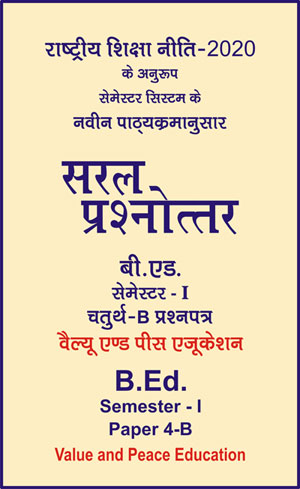|
बी एड - एम एड >> बी.एड. सेमेस्टर-1 प्रश्नपत्र-IV-B - वैल्यू एण्ड पीस एजुकेशन बी.एड. सेमेस्टर-1 प्रश्नपत्र-IV-B - वैल्यू एण्ड पीस एजुकेशनसरल प्रश्नोत्तर समूह
|
5 पाठक हैं |
||||||
बी.एड. सेमेस्टर-1 प्रश्नपत्र-IV-B - वैल्यू एण्ड पीस एजुकेशन (अंग्रेजी भाषा में)
Question- Describe the Nature of Value. Mention its Educational Significance.
Or
Define ‘Views of Values’ in details.
Answer
Nature of Value
Let us try to understand whether values are subjective or objective.
-
Subjective view: According to this view, values do not exist independently of the ‘valuer’ rather they find their origin in a valuing organism. Value is dependent on factors like interest, desire, likes, hard work, determination power, work, or satisfaction. As a result of the combined effort of all these factors, the value is developed in the personal life of an individual and is more attached to the personal experiences of that person. Some educators take the view that educational values are internal and subjective. Thus textbooks, school supplies, and other academic paraphernalia have value because of the relation they bear to pupils and teachers who value them. The environment is neither of worth nor is worthless unless an organism is involved. Upset the organism’s equilibrium, and instinct, emotion, and intellect will at once combine to express a preference. Value is then realized in the native demand for the restoration of balance. In ascribing value to his environment, man is merely projecting these feelings onto the objects to which he pays attention. But by themselves, these objects have no value until connected with some human interest.
-
Objective view: Other educators are inclined to regard educational values as external and objective. To them, value is not just a private inner experience. Rather it is an external quality in the things and circumstances which surround teachers and learners. One way of stating it further is that everything has some form or purpose. For instance, the skilled artisan takes wood and steel and fashions them into schoolroom seats and desks. That is, he gives form to these raw materials. This form lends purpose or value to the product. Value, thus, is incorporated into the object; it is objectively part of it. Apart from the above two views, some Educators and philosophers have a third view that values have a relationistic view.
-
Relationistic view: The educators who follow this view believe that there is a relation between humans and their environment. They consider values to be partially emotions and partially logic or rational in nature.
|
|||||













